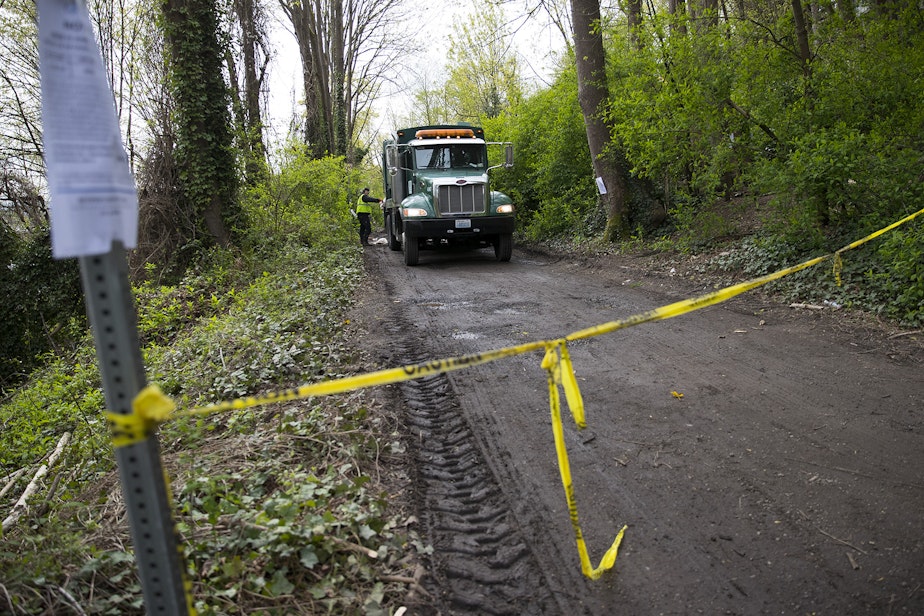What to do with Seattle’s homeless: District 2 candidates debate

Seattle’s City Council candidates in District 2 are at odds on the city’s current approach to unsanctioned homeless camps and how best to pay for more services.
At the Rainier Arts Center Tuesday, candidates Tammy Morales and Mark Solomon were asked whether they endorsed Seattle’s accelerated removals of homeless encampments.
Morales, a community organizer, said no.
“I am a former Seattle Human Rights Commissioner, and we’ve been very vocal about the fact that removing people from one side of the street to the other is not only inhumane, it is a waste of city resources,” Morales said.
She said the city should instead focus on referring people to services.
Her opponent Mark Solomon, a crime prevention coordinator with the Seattle Police Department, said the city’s Navigation Team does connect people with services and refer people to the Law Enforcement-Assisted Diversion program.
Sponsored
Solomon said he supports the cleanups.
“Having been to the encampments,” he said, “having been around those that are living in RVs that are not fit for human habitation – leaving them in those conditions is not humane.”
The candidates are seeking to replace Councilmember Bruce Harrell and represent Sodo and Southeast Seattle. They also took different approaches to seeking new revenue for homeless services.
Morales said she supported the Employee Hours Tax, also known as the head tax or Amazon tax, for homelessness services and wants to revisit it. She said she’s also looking at other progressive options including a vacancy tax, real estate speculation tax or impact fees.
“I don’t have all the answers right now, but we have to have that conversation and we have to figure out what the best mix of alternative revenue options are, so that we move in a more progressive direction,” she said, adding that the city’s current reliance on property tax levies comes “on the backs of working folks.”
Sponsored
Solomon did not advocate any new taxes; he said the city should look to public-private partnerships and philanthropy to fund more services. He also said he would support bonding against Seattle’s sales tax revenue, or creating a public bank “so we can borrow against our own assets to build housing.”
Sponsored
He also suggested a partnership with a company like Honeybucket to open a location on city property for people living in RVs.
“Why don’t we have a central location where people can come, they can have access to showers, restrooms and disposal of their trash and their waste?” he said, adding that “case management is going to be the key to help them move out of those circumstances.”
Morales said for people living in RVs or cars, that vehicle is their home and their one asset.
“I would rather see those folks in a safe lot where they can get access to services until they can get into a more stable situation," she said.
Public safety was also on the minds of voters in the wake of Friday’s shooting at the Westlake light rail station.
Sponsored
Solomon said his main concern is police hiring, which has not kept pace with population growth.
“One thing we need to do is increase our staffing levels for the police department,” he said. “We need to make sure that we have enough resources to respond to priority one calls, to do more proactive policing."
He also said he’d also support nonprofit organizations that work with youth.
Morales said her priority would be “more responsible gun ownership,” building on new requirements for safe storage of firearms.
“One of the things I would like to see is that we pass a gun tracing law because there are a lot of incidents where people make straw purchases, so they buy a gun for somebody who is not authorized to have one,” she said.
Sponsored
“And I would also like to see us have some sort of judicial review that removes firearms from people who have, for example, written a ‘manifesto,’ so we are getting guns off the street and disrupting that market.”
Morales said she’d also like to see investments in violence interruption programs.
This was the first of the debates that the Seattle CityClub will hold in all seven City Council districts, this was the first one. Media partners include KUOW, The Seattle Channel, KING, KOMO, KCTS/Crosscut and The Seattle Times.




